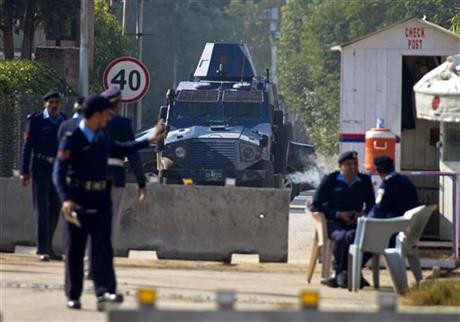
By REBECCA SANTANA and ZARAR KHAN
Pakistani police officers man a security check post outside the residence of former President Pervez Musharraf in Islamabad, Pakistan, Tuesday, Dec. 24, 2013. A bomb scare Tuesday delayed the first hearing in a high treason case against Musharraf, said police and legal officials. (AP Photo/B.K. Bangash)
Pakistan
A vehicle carrying Pakistani judge enters in a court building under tight security in Islamabad, Pakistan, Tuesday, Dec. 24, 2013. A bomb scare Tuesday delayed the first hearing in a high treason case against former Pakistani leader Pervez Musharraf, said police and legal officials. (AP Photo/B.K. Bangash)
Pakistan
Pakistani para-military troops and police officers stand alert outside the court in Islamabad, Pakistan, Tuesday, Dec. 24, 2013. A bomb scare Tuesday delayed the first hearing in a high treason case against former Pakistani leader Pervez Musharraf, said police and legal officials. (AP Photo/B.K. Bangash)
Pervez Musharraf
FILE – In this Monday, April 15, 2013 file photo, Pakistan’s former President and military ruler Pervez Musharraf addresses his party supporters at his house in Islamabad, Pakistan. Musharraf spoken out Friday, Dec. 20, for the first time since his house arrest earlier this year, defending his actions while in power and telling a local TV station he did his best for the nation. (B.K. Bangash, File)
Prev 1 of 4 Next
ISLAMABAD (AP) — A bomb scare delayed the first hearing in a high treason case against former Pakistani leader Pervez Musharraf on Tuesday, police and legal officials said.
The case is the most serious legal problem Musharraf has faced since returning to the country in March in hopes of taking part in upcoming elections. But what followed — a ban on running for office, house arrest and a cascade of legal cases against him — marked a stunning turn in fortunes for a man once considered the most powerful person in Pakistan and a close American ally.
Authorities on Tuesday found an explosive device and two pistols about one kilometer (half a mile) away from Musharraf’s residence on the Islamabad suburbs, said a police official Mohammed Ali.
A lawyer for Musharraf, Anwar Mansoor Khan, told the court that his client could not attend because of a “serious threat to his life.” The chief judge said he understood that it requires “security” to reach the court and directed Musharraf to appear on January 1 for another hearing.
The brief hearing held Tuesday at an auditorium at the National Library was expected to be largely procedural but the significance of having a former army chief appearing in front of a treason court would be enormous in a country where the military’s power has rarely been challenged.
Security was beefed up outside the National Library, and about a dozen paramilitary Rangers were stationed inside the auditorium where the three-judge panel was to hear the case.
The Pakistani Taliban threatened to kill Musharraf after his return from abroad. He earned the enmity of militants in Pakistan for his support while in office for the U.S.-led war in Afghanistan and the military offensives he ordered in Pakistan’s tribal areas as well as a raid on a mosque in Islamabad.
Musharraf took power during a 1999 coup and ruled Pakistan until 2008 when he was forced to step down. He later left the country and spent about four years in self-imposed exile.
He returned in March only to find himself swiftly arrested on numerous charges stemming from his time in office.
The high treason case stems from his 2007 decision to fire and detain some judges including the country’s chief justice after declaring a state of emergency and suspending the constitution.
The move backfired as lawyers supporting the judges took to the streets in widespread protests that eventually weakened Musharraf’s government so much that he was forced to call new elections and step down.
Musharraf has repeatedly said he is not guilty of the charges, and his legal team has portrayed the repeated legal cases as a “vendetta” against him by the judicial community.
On Tuesday, his lawyers filed petitions challenging the formation of the special court, and the appointment of the judges and the prosecutor.
“We think these judges have a bias against our client,” said a member of Musharraf’s legal team, Mohammad Ali Saif.
Musharraf has spent most of his time since returning to the country under house arrest at his sprawling home in the Islamabad suburbs. The former army commando spends his time working out, swimming in his pool and visiting with old friends, says his legal team.
__
Associated Press writer Munir Ahmed contributed to this report.


